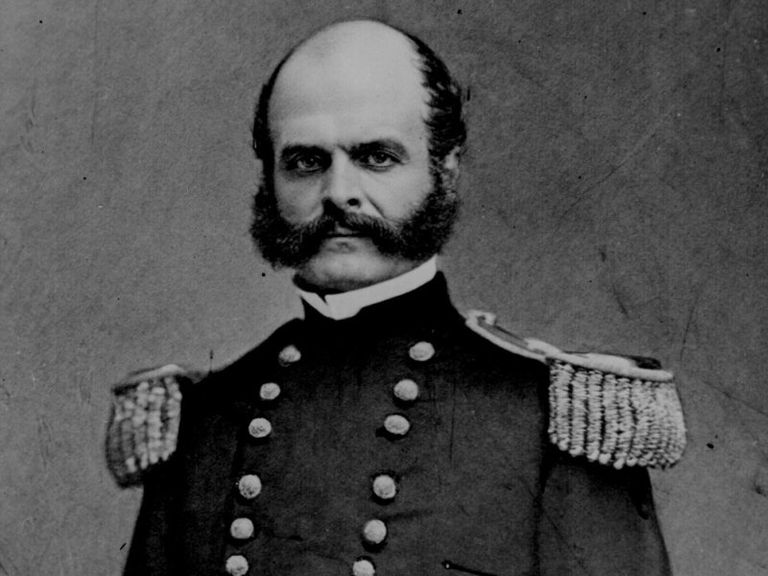The Peppery Crack in Burnside’s Affable Veneer

An adjective I often hear used to describe Ambrose Burnside is “affable.” He might not have been well respected for battlefield prowess by his peers, but he was very likeable and very well liked.
But the friendly veneer of even the most affable man can crack under the pressure of combat.
Horace Porter, a member of Ulysses S. Grant’s staff, shared a story of just such a time. It occurred during the battle of the Crater, so the situation wasn’t so funny, but Porter’s telling of it was.
The story also involved Army of the Potomac commander George Gordon Meade, a man not known for his affability, especially during combat. Famously, men called him the “damned google-eyed snapping turtle” because of his temper and his eyeglasses. My own favorite name for him comes from his aide, Theodore Lyman, who referred him “Old Peppery.”
Burnside’s men had become trapped in the Crater, and Meade received reports of a slaughter taking place there. He ordered Burnside to withdraw his troops, but Burnside seemed not to comply. As Porter tells it:
Instructions were reiterated to Burnside to withdraw the troops; but he came to Meade in person and insisted that his men could not be drawn out of the crater with safety; that the enemy’s guns now bore upon the only line of retreat; and that there must be a passageway dug to protect them in crossing certain dangerous points.
But here comes the good part:
Both of these officers lost their tempers that morning, although Burnside was usually the personification of amiability, and the scene between them was decidedly peppery, and went far toward confirming one’s belief in the wealth and flexibility of the English language as a medium of personal dispute.
Burnside concluded, “Were it not insubordinate, I would say that the latter remark of your note was unofficerlike and ungentlemanly.”
How about that: “the wealth and flexibility of the English language as a medium of personal dispute.” Ha! What a phrase! Can you picture the affable Burnside swearing up a blue streak?
Porter says the story had a happy ending, at least as far as Meade and Burnside went: “[B]oth officers were manly enough afterward to express regret for what they had written and said under the excitement of the occasion.”
General in Chief Ulysses S. Grant was a bit less forgiving about the day. The battle of the Crater was “a stupendous failure” which Grant blamed largely “due to inefficiency on the part of the corps commander.” As a result, Burnside would be sent home to Rhode Island to await further instructions that never came.
I wonder how affable he was as he waited.
————
This tale come from Horace Porter, Campaigning with Grant, 267. Grant’s quote at the end comes from his memoirs, volume 2, pg. 315.
Peppery. I like that. The only other time I’ve seen someone described as “peppery” was for Frank and Joe Hardy’s Aunt Gertrude, who lived with the sleuths’ family. Apparently she had a peppery crack as well.
Burnside was the convenient fall guy for Grant’s blunder in tactically interfering in the original assault plan
Correct. Grant had a penchant for blaming others for his errors throughout the war. Perhaps he had a peppery crack too?